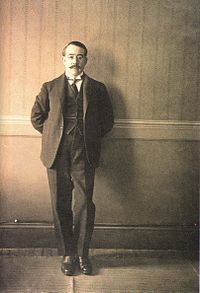|
|
Tuesday, May 19th, 2009
Padeces cautiverio, pero habrás dado una palabra al poema.
I was reading from Labyrinths this afternoon and took a look at the third section of the book, "Parables", which had totally slipped from my memory. It is very short pieces, a page or less, not quite "fictions" because they are not plotted, just quick, terse observations of the human condition. The first two pieces, "Inferno, I, 32" and "Paradisio, XXXI, 108" use Dante's comedy to posit the impossibility of knowing one's place in the universe. Sharp and sweet. It looks like these pieces are almost all taken from Borges' 1960 book El hacedor (I think this is roughly "The Creator"; it was published in English as "Dreamtigers"), which is available online from literatura.us -- I think I will try to read some of them in their original language. (A note about translations, though: the translations in Labyrinths, mostly done by James E. Irby, are head and shoulders above the other Borges translations I've been looking at, mostly by Anthony Bonner.)Perhaps some feature of that crucified countenance lurks in every mirror; perhaps the face died, was obliterated, so that God could be all of us.Who knows whether tonight we shall not see it in the labyrinth of our dreams and not even know it tomorrow.
posted evening of May 19th, 2009: Respond
➳ More posts about Jorge Luis Borges
|  |
Wednesday, May 20th, 2009
Wow, sometimes a passage of  reading just sends you scrambling for reference materials... reading just sends you scrambling for reference materials... A izquierda y a la derecha, absortos en su lúcido sueño, se perfilan los rostros momentáneos de los lectores, a la luz de las lámparas estudiosas, como en la hipálage de Milton. This comes from the dedication at the front of Borges' El hacedor -- Borges is dedicating the book to his deceased countryman Leopoldo Lugones, and imagining a library where he would give the book to Lugones. "To the left and to the right, absorbed in their lucid dream, the momentary faces of the readers are outlined in the light of the studious lamps, as in the hypallage of Milton." Wait -- the what of Milton? Wikipædia is useful as normal -- "studious lamps" is a hypallage, an application of the adjective to a different word than the one it's actually describing. Now I was curious and wanted to know why Borges was making reference to Milton here. So I looked; and in the course of surfing around trying to figure it out, made a very useful discovery. In Dreamtigers, Mildred Boyer translates "lámparas estudiosas" as "bright officious lamps" -- why? A search for that phrase brings one directly to the source passage in Milton -- Paradise Lost IX.103-4: Terrestrial Heav'n, danced round by other Heav'ns,
That shine, yet bear their bright, officious lamps I spent a little while trying to figure this one out -- is "officious" rendered as "estudiosas" in the Spanish translation of Milton? That would not make a lot of sense, and besides I'm sure Borges read Milton in English. Ultimately I think it is just a really weird choice on Boyer's part -- Borges is not quoting Milton, he's alluding to him, but Boyer seems to be committed to a reading that says Borges is quoting Milton -- and thus makes the usage not be a hypallage but simply an incoherency. But look at how Andrew Hurley translates the passage in Collected Fictions:To left and right, absorbed in their
waking dream, rows of readers' momentary profiles in the light of
the 'scholarly lamps,' as a Miltonian displacement of adjectives
would have it. This is a little wordy maybe -- but it communicates the image in Borges' piece precisely, indeed it allows me to see the image much more clearly than I had when I was grappling with this unfamiliar word "hypallage".I came across Hurley's translation in an essay he wrote for Cadernos de Tradução, the journal of the translation department at Universida de Federal de Santa Caterina in Florianópolis, Brasil: What I Lost When I Translated Jorge Luis Borges [PDF]. It is a magnificent article and I want to post about it in more detail, but I strongly encourage anyone interested in Borges to read it. One of Hurley's points in this piece is that the hypallage is a key element of Borges' style. In the following sentences, Borges refers to two more instances of hypallage: the "arid camel" from Lugones' own Lunario sentimental, and Æneid VI.268: Ibant obscuri sola sub nocte per umbram (approx. "They passed in darkness under the lonely night through shadow." -- according to Borges, a line that both "employs and surpasses this artifice.")You can hear Borges reading this dedication at Poema en audio. Lots more of his readings there too, which I haven't begun to check through yet.
posted evening of May 20th, 2009: 7 responses
➳ More posts about Readings
|  |
Tuesday, December 7th, 2010
 Many thanks to commenter Mariano on last year's Hypallage post for his valuable information about the image from Milton that Borges references in his dedication of El hacedor to Lugones. Mariano points out that beyond the fact that "las lámparas estudiosas" is clearly not quoting the "bright officious lamps" of Paradise Lost, book Ⅸ, there is not even any reference to this passage; rather, we have a quote from Milton's Areopagitica, a tract he wrote for Parliament in opposition to censorship. Many thanks to commenter Mariano on last year's Hypallage post for his valuable information about the image from Milton that Borges references in his dedication of El hacedor to Lugones. Mariano points out that beyond the fact that "las lámparas estudiosas" is clearly not quoting the "bright officious lamps" of Paradise Lost, book Ⅸ, there is not even any reference to this passage; rather, we have a quote from Milton's Areopagitica, a tract he wrote for Parliament in opposition to censorship.
Behold now this vast City: a City of refuge, the mansion house of liberty, encompast and surrounded with his protection; the shop of warre hath not there more anvils and hammers waking, to fashion out the plates and instruments of armed Justice in defence of beleaguer'd Truth, then there be pens and heads there, sitting by their studious lamps, musing, searching, revolving new notions and idea's wherewith to present, as with their homage and their fealty the approaching Reformation: others as fast reading, trying all things, assenting to the force of reason and convincement. So, well, this means that both Boyer's translation and Hurley's have problems. Boyer is correct in calling the phrase "the hypallage of Milton" (though I would like "Milton's hypallage" better) -- Hurley's "a Miltonian displacement of adjectives" is clumsy and does not communicate Borges' intent. And Hurley has "scholarly lamps", which undoes the quotation. But Boyer quotes the wrong passage of Milton! That spoils the image. The image from Areopagitica makes complete sense as a part Borges' dedication, while the image from Paradise Lost seemed pretty out of keeping with the context.
 ...Reinventing the wheel dept. -- I see Michael Gilleland of Laudator Temporis Acti wrote about this last November, saying "as others have noted" -- guess it's not a new piece of knowledge. Nice to have on hand though.
posted evening of December 7th, 2010: 1 response
➳ More posts about Translation
| |
|
Drop me a line! or, sign my Guestbook.
•
Check out Ellen's writing at Patch.com.
| |

